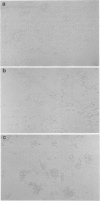Abstract
Antisense oligonucleotides targeting p53 have been hailed as a potentially new technique for treating patients with cancer, and there have been encouraging reports of good patient tolerance in vivo and of antiproliferative effects in vitro. However, evidence is lacking that these oligonucleotides are acting via an antisense interaction to modulate p53 expression. We examined a phosphorothioate antisense oligonucleotide, directed against exon 10 of the TP53 gene, and a chimaeric phosphorothioate-phosphodiester oligonucleotide directed against the p53 translation initiation codon. Both failed to specifically suppress p53 protein production in a cell-free assay system or to have any effect on mutant p53 expression by human pancreatic cancer cell lines. Antiproliferative effects were apparent, especially with the phosphorothioate antisense oligonucleotide, but this was independent of the p53 status of the cells (mutant, wild-type or absent) and also occurred with the control (sense and randomised) oligonucleotides. The most dramatic antiproliferative effects were seen with the 'control' phosphorothioate oligonucleotides. These findings suggest that the antiproliferative effects of some antisense oligonucleotides may be unrelated to expression of the gene they have been designed to target.
Full text
PDF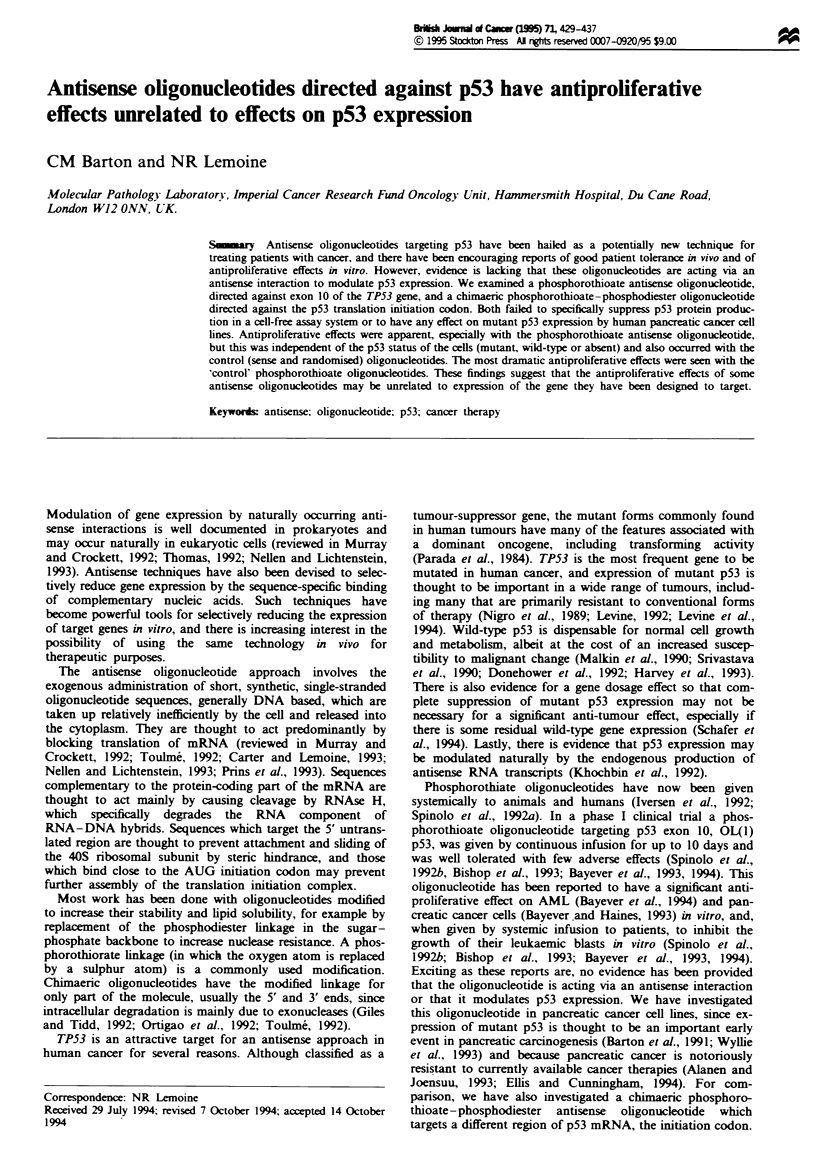
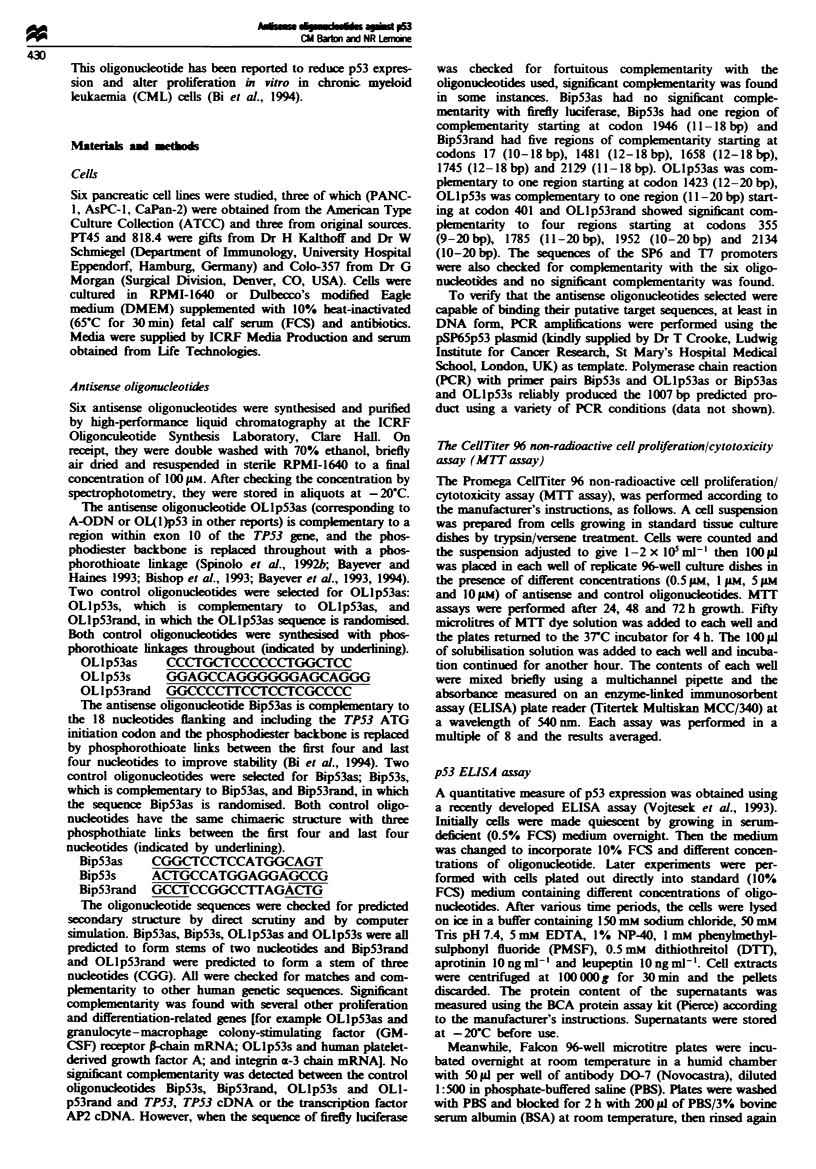
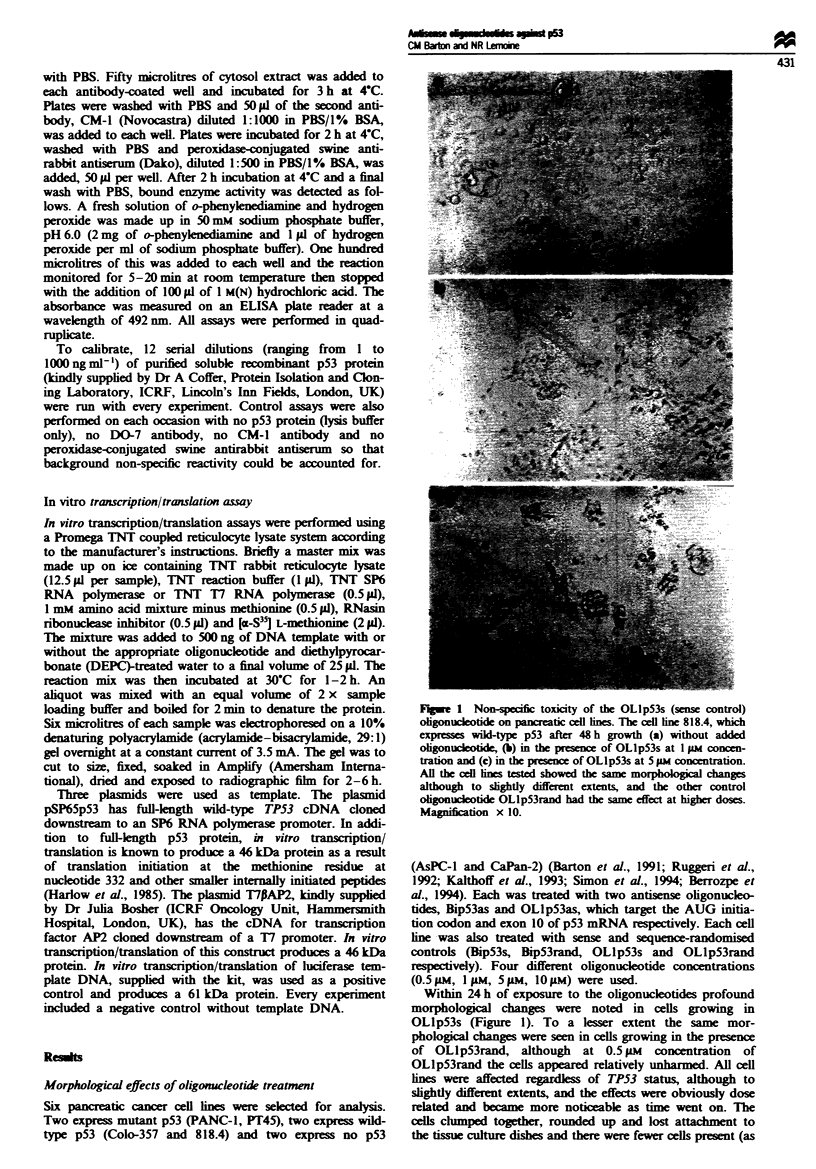
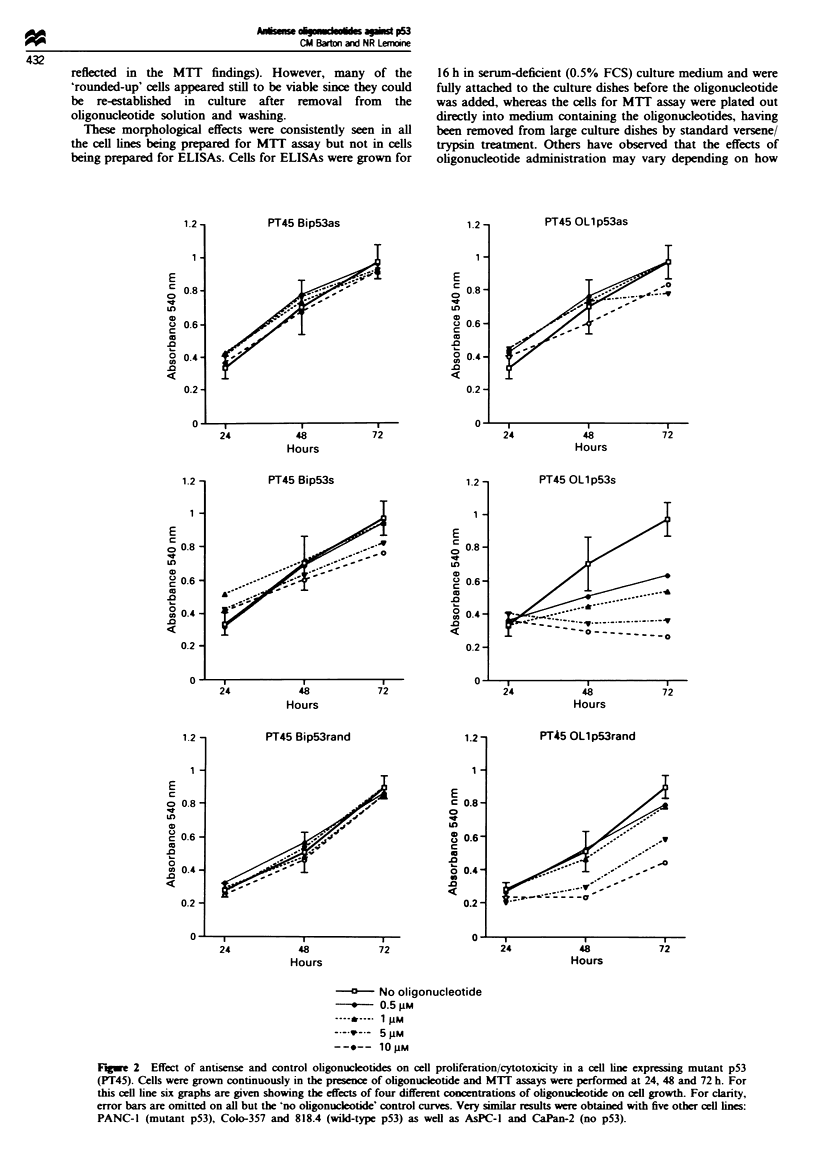
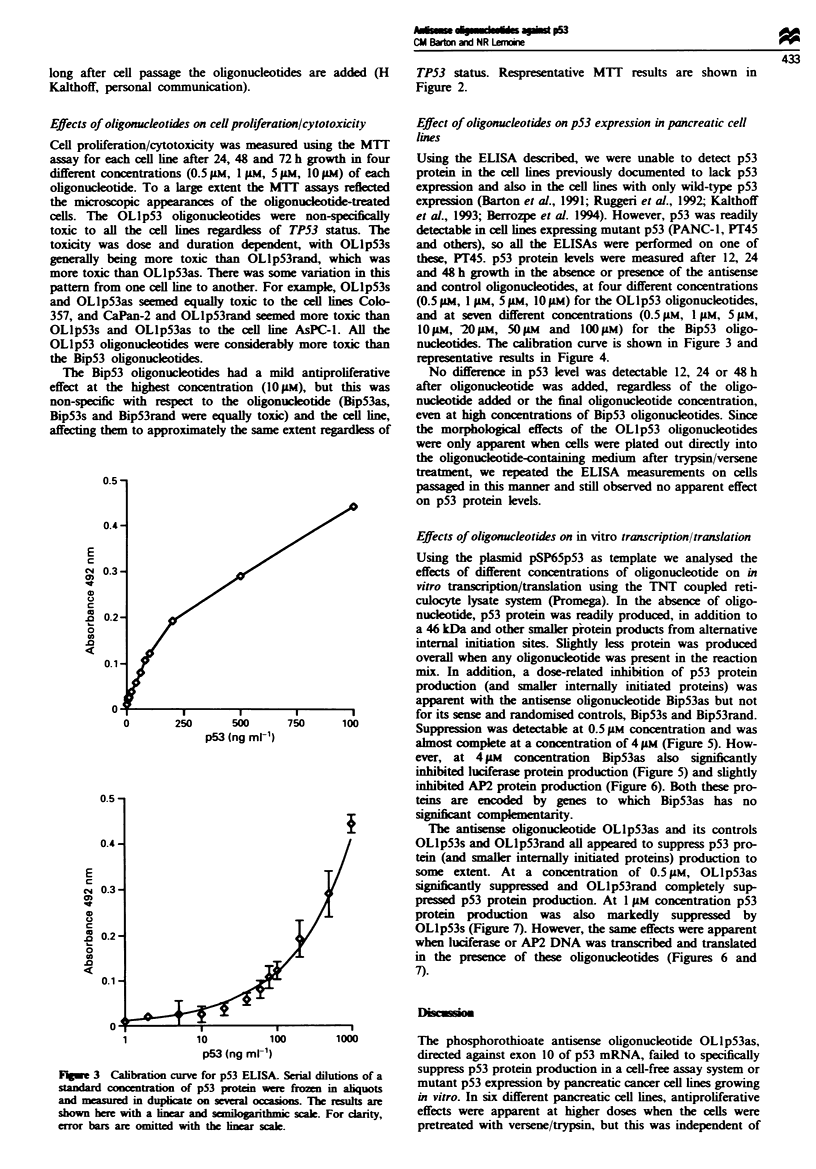
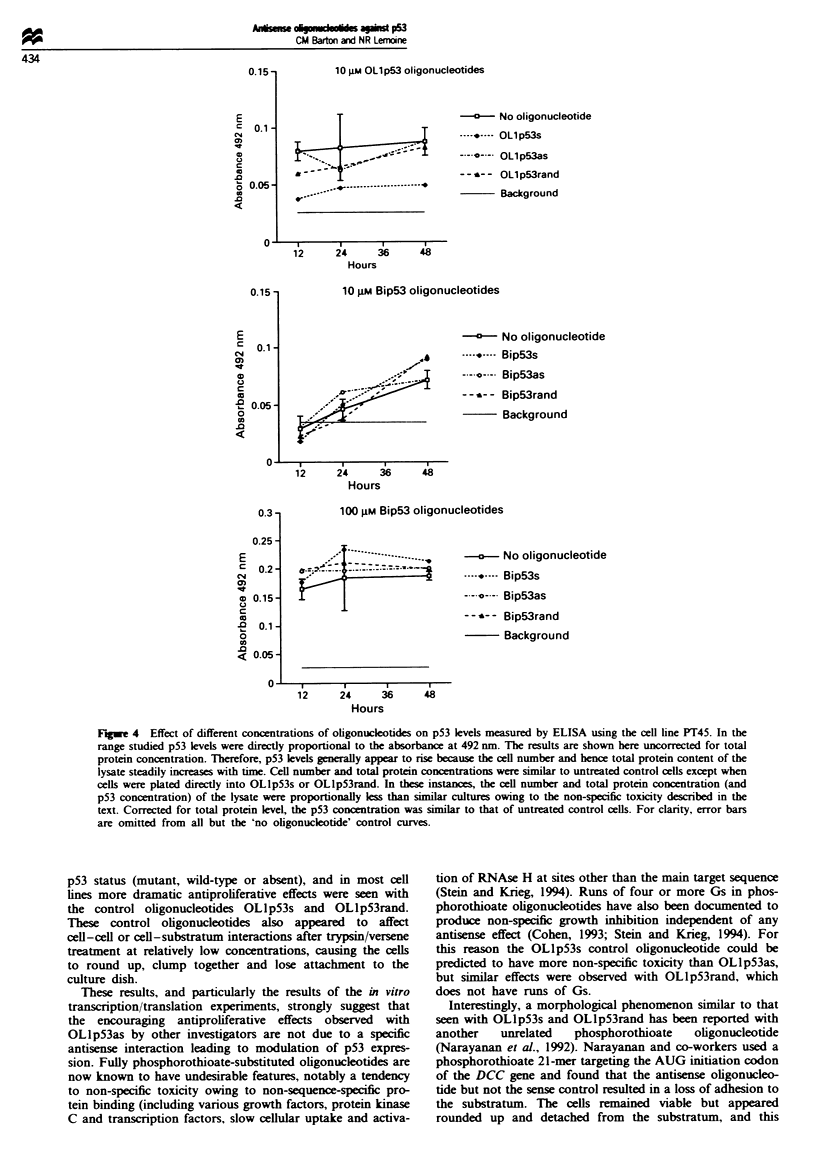
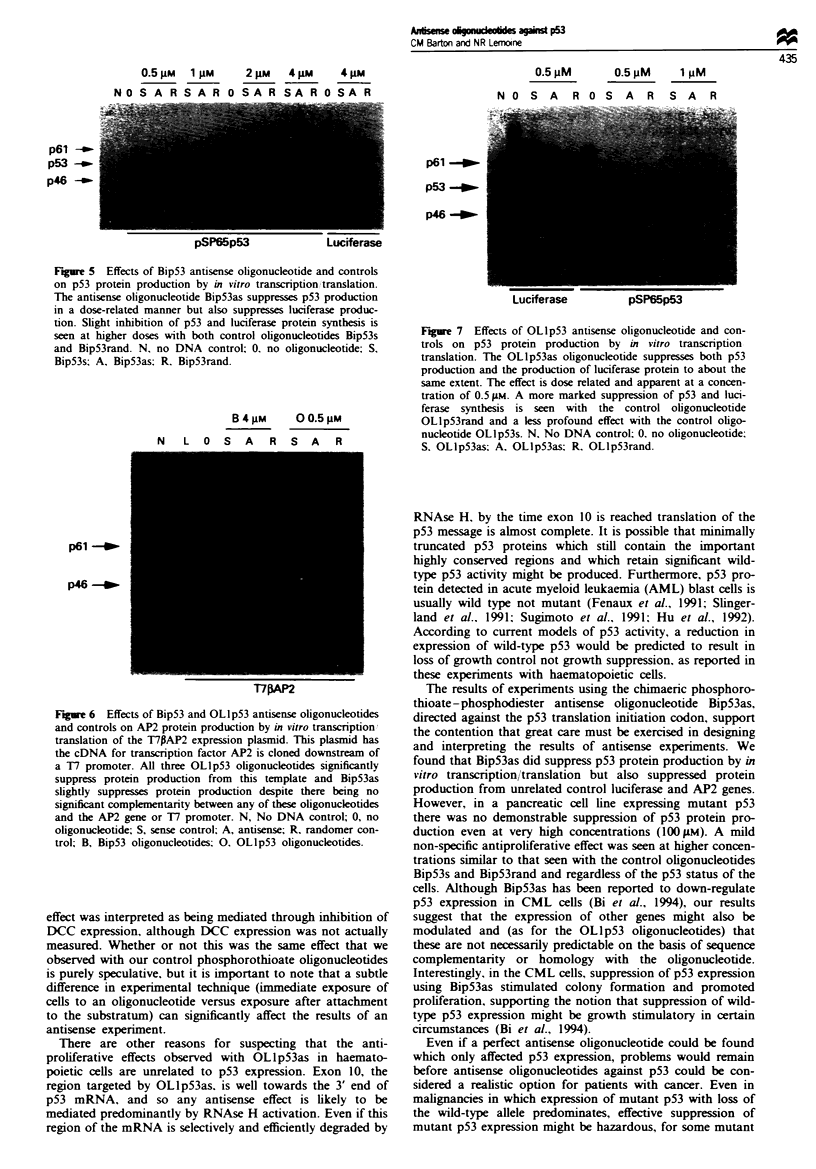
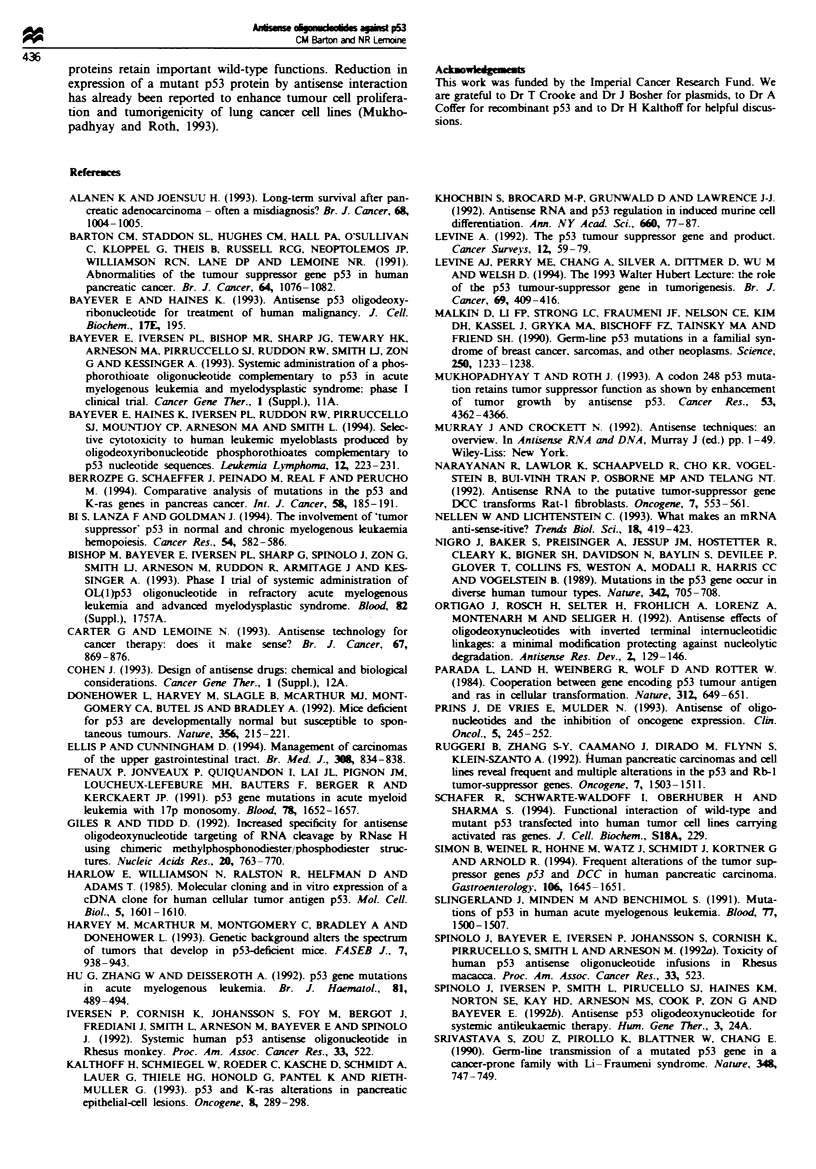

Images in this article
Selected References
These references are in PubMed. This may not be the complete list of references from this article.
- Alanen K. A., Joensuu H. Long-term survival after pancreatic adenocarcinoma--often a misdiagnosis? Br J Cancer. 1993 Nov;68(5):1004–1005. doi: 10.1038/bjc.1993.469. [DOI] [PMC free article] [PubMed] [Google Scholar]
- Barton C. M., Staddon S. L., Hughes C. M., Hall P. A., O'Sullivan C., Klöppel G., Theis B., Russell R. C., Neoptolemos J., Williamson R. C. Abnormalities of the p53 tumour suppressor gene in human pancreatic cancer. Br J Cancer. 1991 Dec;64(6):1076–1082. doi: 10.1038/bjc.1991.467. [DOI] [PMC free article] [PubMed] [Google Scholar]
- Bayever E., Haines K. M., Iversen P. L., Ruddon R. W., Pirruccello S. J., Mountjoy C. P., Arneson M. A., Smith L. J. Selective cytotoxicity to human leukemic myeloblasts produced by oligodeoxyribonucleotide phosphorothioates complementary to p53 nucleotide sequences. Leuk Lymphoma. 1994 Jan;12(3-4):223–231. doi: 10.3109/10428199409059593. [DOI] [PubMed] [Google Scholar]
- Berrozpe G., Schaeffer J., Peinado M. A., Real F. X., Perucho M. Comparative analysis of mutations in the p53 and K-ras genes in pancreatic cancer. Int J Cancer. 1994 Jul 15;58(2):185–191. doi: 10.1002/ijc.2910580207. [DOI] [PubMed] [Google Scholar]
- Bi S., Lanza F., Goldman J. M. The involvement of "tumor suppressor" p53 in normal and chronic myelogenous leukemia hemopoiesis. Cancer Res. 1994 Jan 15;54(2):582–586. [PubMed] [Google Scholar]
- Carter G., Lemoine N. R. Antisense technology for cancer therapy: does it make sense? Br J Cancer. 1993 May;67(5):869–876. doi: 10.1038/bjc.1993.164. [DOI] [PMC free article] [PubMed] [Google Scholar]
- Donehower L. A., Harvey M., Slagle B. L., McArthur M. J., Montgomery C. A., Jr, Butel J. S., Bradley A. Mice deficient for p53 are developmentally normal but susceptible to spontaneous tumours. Nature. 1992 Mar 19;356(6366):215–221. doi: 10.1038/356215a0. [DOI] [PubMed] [Google Scholar]
- Ellis P., Cunningham D. Management of carcinomas of the upper gastrointestinal tract. BMJ. 1994 Mar 26;308(6932):834–838. doi: 10.1136/bmj.308.6932.834. [DOI] [PMC free article] [PubMed] [Google Scholar]
- Fenaux P., Jonveaux P., Quiquandon I., Laï J. L., Pignon J. M., Loucheux-Lefebvre M. H., Bauters F., Berger R., Kerckaert J. P. P53 gene mutations in acute myeloid leukemia with 17p monosomy. Blood. 1991 Oct 1;78(7):1652–1657. [PubMed] [Google Scholar]
- Giles R. V., Tidd D. M. Increased specificity for antisense oligodeoxynucleotide targeting of RNA cleavage by RNase H using chimeric methylphosphonodiester/phosphodiester structures. Nucleic Acids Res. 1992 Feb 25;20(4):763–770. doi: 10.1093/nar/20.4.763. [DOI] [PMC free article] [PubMed] [Google Scholar]
- Harlow E., Williamson N. M., Ralston R., Helfman D. M., Adams T. E. Molecular cloning and in vitro expression of a cDNA clone for human cellular tumor antigen p53. Mol Cell Biol. 1985 Jul;5(7):1601–1610. doi: 10.1128/mcb.5.7.1601. [DOI] [PMC free article] [PubMed] [Google Scholar]
- Harvey M., McArthur M. J., Montgomery C. A., Jr, Bradley A., Donehower L. A. Genetic background alters the spectrum of tumors that develop in p53-deficient mice. FASEB J. 1993 Jul;7(10):938–943. doi: 10.1096/fasebj.7.10.8344491. [DOI] [PubMed] [Google Scholar]
- Hu G., Zhang W., Deisseroth A. B. P53 gene mutations in acute myelogenous leukaemia. Br J Haematol. 1992 Aug;81(4):489–494. doi: 10.1111/j.1365-2141.1992.tb02979.x. [DOI] [PubMed] [Google Scholar]
- Kalthoff H., Schmiegel W., Roeder C., Kasche D., Schmidt A., Lauer G., Thiele H. G., Honold G., Pantel K., Riethmüller G. p53 and K-RAS alterations in pancreatic epithelial cell lesions. Oncogene. 1993 Feb;8(2):289–298. [PubMed] [Google Scholar]
- Khochbin S., Brocard M. P., Grunwald D., Lawrence J. J. Antisense RNA and p53 regulation in induced murine cell differentiation. Ann N Y Acad Sci. 1992 Oct 28;660:77–87. doi: 10.1111/j.1749-6632.1992.tb21060.x. [DOI] [PubMed] [Google Scholar]
- Levine A. J., Perry M. E., Chang A., Silver A., Dittmer D., Wu M., Welsh D. The 1993 Walter Hubert Lecture: the role of the p53 tumour-suppressor gene in tumorigenesis. Br J Cancer. 1994 Mar;69(3):409–416. doi: 10.1038/bjc.1994.76. [DOI] [PMC free article] [PubMed] [Google Scholar]
- Levine A. J. The p53 tumour suppressor gene and product. Cancer Surv. 1992;12:59–79. [PubMed] [Google Scholar]
- Malkin D., Li F. P., Strong L. C., Fraumeni J. F., Jr, Nelson C. E., Kim D. H., Kassel J., Gryka M. A., Bischoff F. Z., Tainsky M. A. Germ line p53 mutations in a familial syndrome of breast cancer, sarcomas, and other neoplasms. Science. 1990 Nov 30;250(4985):1233–1238. doi: 10.1126/science.1978757. [DOI] [PubMed] [Google Scholar]
- Mukhopadhyay T., Roth J. A. A codon 248 p53 mutation retains tumor suppressor function as shown by enhancement of tumor growth by antisense p53. Cancer Res. 1993 Sep 15;53(18):4362–4366. [PubMed] [Google Scholar]
- Narayanan R., Lawlor K. G., Schaapveld R. Q., Cho K. R., Vogelstein B., Bui-Vinh Tran P., Osborne M. P., Telang N. T. Antisense RNA to the putative tumor-suppressor gene DCC transforms Rat-1 fibroblasts. Oncogene. 1992 Mar;7(3):553–561. [PubMed] [Google Scholar]
- Nellen W., Lichtenstein C. What makes an mRNA anti-sense-itive? Trends Biochem Sci. 1993 Nov;18(11):419–423. doi: 10.1016/0968-0004(93)90137-c. [DOI] [PubMed] [Google Scholar]
- Nigro J. M., Baker S. J., Preisinger A. C., Jessup J. M., Hostetter R., Cleary K., Bigner S. H., Davidson N., Baylin S., Devilee P. Mutations in the p53 gene occur in diverse human tumour types. Nature. 1989 Dec 7;342(6250):705–708. doi: 10.1038/342705a0. [DOI] [PubMed] [Google Scholar]
- Ortigão J. F., Rösch H., Selter H., Fröhlich A., Lorenz A., Montenarh M., Seliger H. Antisense effect of oligodeoxynucleotides with inverted terminal internucleotidic linkages: a minimal modification protecting against nucleolytic degradation. Antisense Res Dev. 1992 Summer;2(2):129–146. doi: 10.1089/ard.1992.2.129. [DOI] [PubMed] [Google Scholar]
- Parada L. F., Land H., Weinberg R. A., Wolf D., Rotter V. Cooperation between gene encoding p53 tumour antigen and ras in cellular transformation. Nature. 1984 Dec 13;312(5995):649–651. doi: 10.1038/312649a0. [DOI] [PubMed] [Google Scholar]
- Prins J., de Vries E. G., Mulder N. H. Antisense of oligonucleotides and the inhibition of oncogene expression. Clin Oncol (R Coll Radiol) 1993;5(4):245–252. doi: 10.1016/s0936-6555(05)80238-9. [DOI] [PubMed] [Google Scholar]
- Ruggeri B., Zhang S. Y., Caamano J., DiRado M., Flynn S. D., Klein-Szanto A. J. Human pancreatic carcinomas and cell lines reveal frequent and multiple alterations in the p53 and Rb-1 tumor-suppressor genes. Oncogene. 1992 Aug;7(8):1503–1511. [PubMed] [Google Scholar]
- Simon B., Weinel R., Höhne M., Watz J., Schmidt J., Körtner G., Arnold R. Frequent alterations of the tumor suppressor genes p53 and DCC in human pancreatic carcinoma. Gastroenterology. 1994 Jun;106(6):1645–1651. doi: 10.1016/0016-5085(94)90422-7. [DOI] [PubMed] [Google Scholar]
- Slingerland J. M., Minden M. D., Benchimol S. Mutation of the p53 gene in human acute myelogenous leukemia. Blood. 1991 Apr 1;77(7):1500–1507. [PubMed] [Google Scholar]
- Srivastava S., Zou Z. Q., Pirollo K., Blattner W., Chang E. H. Germ-line transmission of a mutated p53 gene in a cancer-prone family with Li-Fraumeni syndrome. Nature. 1990 Dec 20;348(6303):747–749. doi: 10.1038/348747a0. [DOI] [PubMed] [Google Scholar]
- Stein C. A., Krieg A. M. Problems in interpretation of data derived from in vitro and in vivo use of antisense oligodeoxynucleotides. Antisense Res Dev. 1994 Summer;4(2):67–69. doi: 10.1089/ard.1994.4.67. [DOI] [PubMed] [Google Scholar]
- Sugimoto K., Toyoshima H., Sakai R., Miyagawa K., Hagiwara K., Hirai H., Ishikawa F., Takaku F. Mutations of the p53 gene in lymphoid leukemia. Blood. 1991 Mar 15;77(6):1153–1156. [PubMed] [Google Scholar]
- Vojtesek B., Fisher C. J., Barnes D. M., Lane D. P. Comparison between p53 staining in tissue sections and p53 proteins levels measured by an ELISA technique. Br J Cancer. 1993 Jun;67(6):1254–1258. doi: 10.1038/bjc.1993.234. [DOI] [PMC free article] [PubMed] [Google Scholar]
- Wyllie F. S., Lemoine N. R., Barton C. M., Dawson T., Bond J., Wynford-Thomas D. Direct growth stimulation of normal human epithelial cells by mutant p53. Mol Carcinog. 1993;7(2):83–88. doi: 10.1002/mc.2940070205. [DOI] [PubMed] [Google Scholar]



